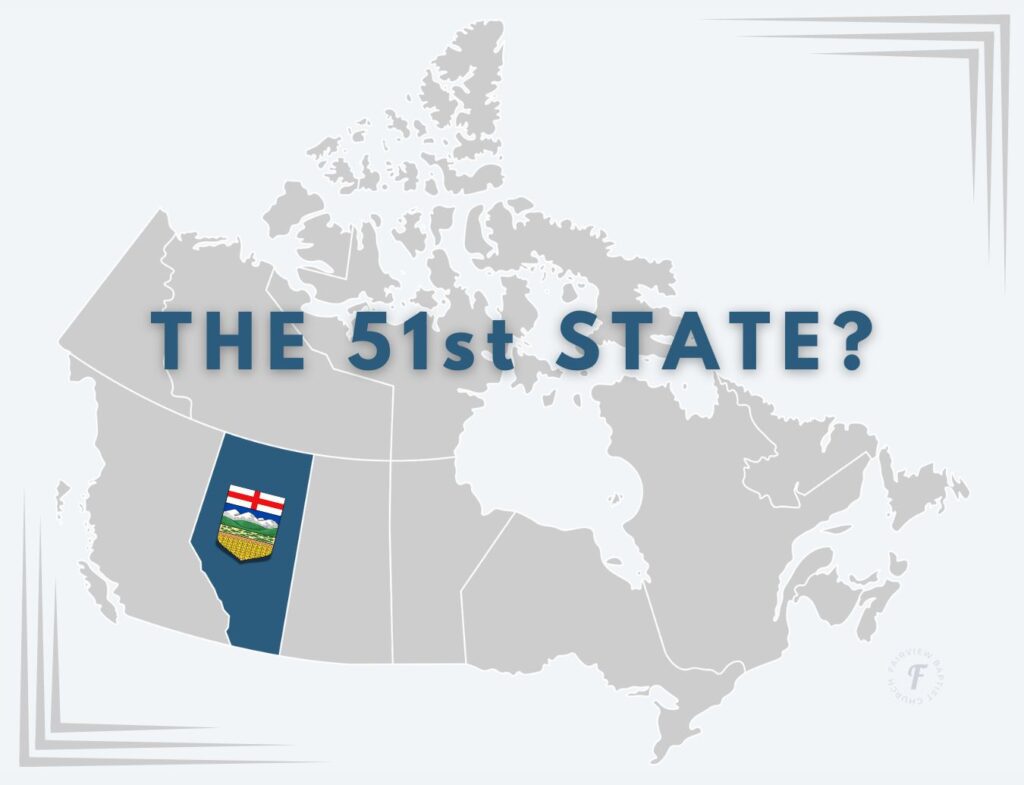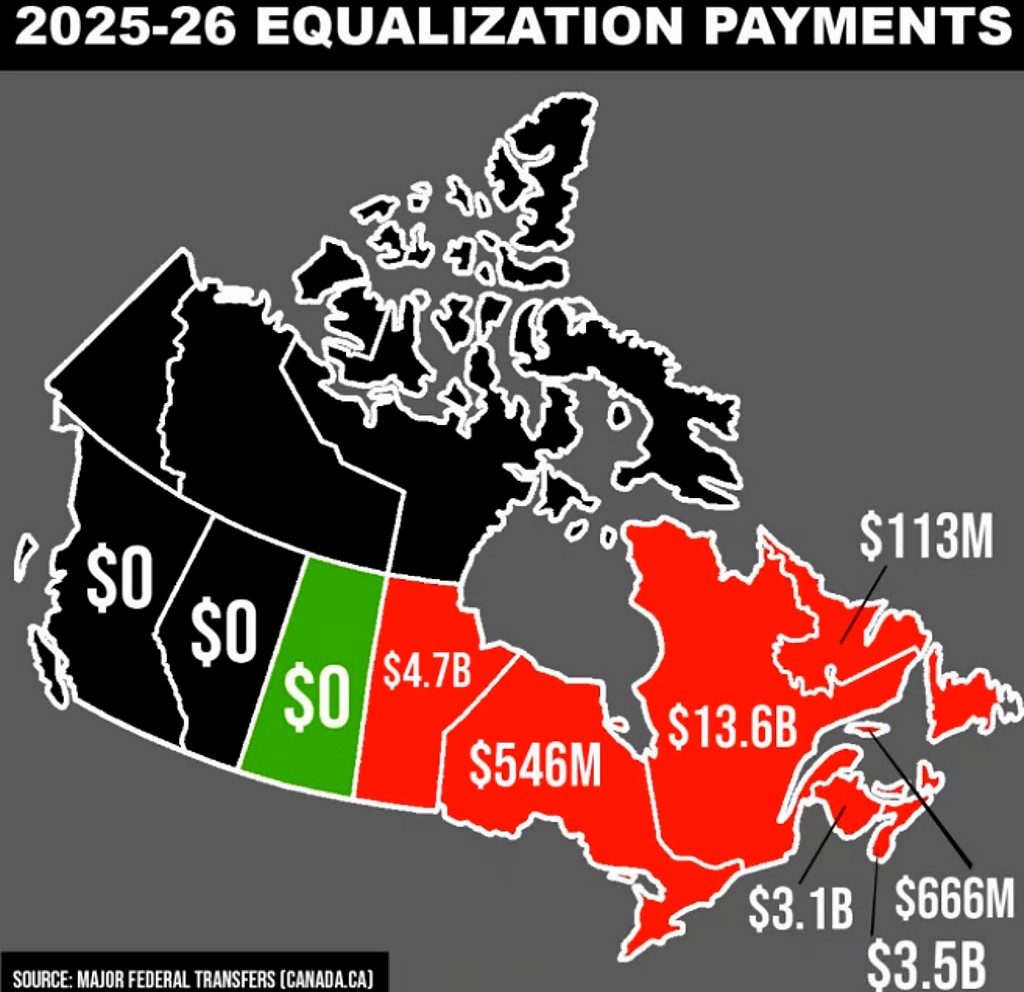
It is beyond question that power in Canada is centralized in Ontario and Quebec. Alberta, on the other hand, has been ignored, alienated, and sometimes exploited by Central Canada.
Talk of Western independence is seemingly on the rise with books, articles, more articles, and social media posts raising the issue. US President Donald Trump has repeatedly pressed the idea that Canada should become a state, arguing that Canada is not viable as a country except for its proximity with the United States.
Donald Trump has stated that the US should no longer subsidize Canada. He wants a fair deal. People in Alberta are sympathetic to such sentiments since Alberta can make a good case that it has subsidized Central Canada for decades without any fair reciprocity. When will Alberta get a fair deal?
Simply by looking at the map of equalization payments in the coming year, how can it be argued that Western Canada is not justified in feeling exploited?

Source: Western Standard (https://www.westernstandard.news/news/quebec-gets-136-billion-in-transfer-payments-west-gets-zero-in-2025/60834)
There are several other grievances that Alberta—and Western Canada in general—can highlight beyond transfer payments. Central Canada has been enriched by Alberta energy while waging war against it. Legislation and approvals that block pipelines, bills and policies that prevent the export of LNG and other energy products have not allowed Alberta to capitalize on its own resources. Many companies and people have left for greener pastures in the United States after facing roadblock after roadblock because of Central Canada. The bias is evident when “environmental” legislation is passed to ban oil tankers on Canada’s west coast which exports Western energy while continuing to allow oil tankers on the east coast which imports Saudi Arabian oil to Central Canada. For what good reason is Central Canada adding to the wealth of Saudi Arabia while hindering the wealth of Alberta?
Alberta has little recourse considering that the balance of power resides in Ontario and Quebec. Albertans have long desired senate reform where the senate could be elected, and provinces, regardless of population, would have equal representation like the American model. Western alienation in the 1980s when Pierre Trudeau was Prime Minister led to a political reform movement that eventually saw Stephen Harper become Prime Minister. But when Harper sought to reform the senate, he was blocked by the Supreme Court of Canada. To add insult to injury, rather than an elected senate, Justin Trudeau has now appointed 93 senators out of a possible 105 seats! He, like his father, has only furthered the divide between Alberta and Central Canada. As it currently stands, Alberta has little to zero influence on federal policies that continue to exploit and alienate the West.
The feeling of alienation is not just geographic, economic, political, or cultural, it is increasingly personal. I’ve lost several dear friends who have picked up and left Alberta to move to Texas. Their reasoning is simple. They want a future for their children where they can work hard and enjoy the fruit of their labor. They want to be in a place where they have a say in the kind of country they live in.
I’m convinced that the time is right to discuss Alberta’s independence and bring the United States and Central Canada to the bargaining table. It is time to unleash the potential of Alberta rather than extinguish it.
Let me share three biblical reasons related to this conviction:
1. The Biblical Principle of Limited Government
Under the rule of Christ (Matt 28:18) all power is limited as to its extent and its power. That is, every government, under God, is limited in terms of its jurisdiction and its authority (Rom 13:1–5).[1]
The nature of the 10 commandments as prohibitions exemplify the heart of God’s law in protecting rights of individuals rather than granting powers to the state to regulate every aspect of life (Exod 20:13–17). The Bible makes much of responsibility in an individual and the family rather than give credence to a welfare state that provides the necessities of life from the cradle to the grave.
As such, limited government is an outgrowth of Christian thinking and societies flourish when they are ordered in keeping with God’s will and design.
Albertans, for the most part, do not want socialism while Central Canada seems to have a penchant for it. If provincial and federal voting patterns reveal anything about the political aspirations of Albertans, they reveal that we want a non-socialist, limited government that gets out of the way so we can work and build a future for ourselves and our children.
2. The Biblical Principle of Local Government
Secondly, governments should not only be limited in their scope and authority but should also be local. It was Lincoln in his Gettysburg address which promised “that this nation, under God, shall have a new birth of freedom and that government of the people, by the people, for the people, shall not perish from the earth.” This principle is a biblical one. Those who bear the weight of making decisions in government should also be those who stand directly accountable for their decisions.
A father cannot be permanently absent from the home, ruling from 3000 kilometers away, yet suppose that he can still govern his home effectively when he bears zero consequence for the decisions he makes. So too, a federal government, 3000 kilometers away, cannot suppose it can govern well when it bears zero consequences for its policies that hurt Alberta.
Currently, politicians in Ottawa are accountable to the voters of Ontario and Quebec but not the voters of Alberta. It is Ontario and Quebec that decide the outcome of our federal elections. The federal government continues to block pathways for a prosperous Alberta. This pattern shows no signs of abating as the Alberta government currently has 10 ongoing court cases related to federal policy encroaching or violating provincial jurisdiction.
The colonies decried taxation without representation, and so should Albertans. This concept, not an American one but a Christian one, traces its history back to the Magna Carta in 1215. That is, this concept of a local government emerged from Christian principles and remains a pillar of a just society.
3. The Biblical Principle of Loving Our Neighbor
Lastly, the grievances of Albertans need redressing since we are called to love our neighbor. The grievances listed in this essay are real but only part of the problem. Future federal policies and climate laws will adversely affect Albertans.
This is not a mere difference in political policy. A totalitarian impulse from Central Canada over the western provinces affects our neighbors’ livelihoods and lives. Businesses have closed. Work has moved south of the border. People are leaving. Those who cannot leave suffer. Out of love for our neighbor, we must resist tyranny and oppression in all forms.
I do not just want a free and prosperous Alberta for myself and my children, but I want a free and prosperous Alberta for all my fellow neighbors. For the betterment of all Albertans and western Canadians, it is time to stand and fight for a brighter future.
[1] Watch this video on Sphere Sovereignty for more info: https://www.fairviewbaptistchurch.ca/sphere-sovereignty-the-role-of-family-church-and-state/
